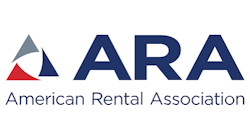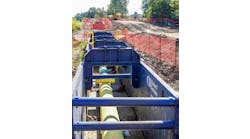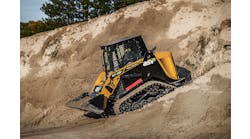ARA Forecast Remains Bullish on Equipment Rental Revenue Growth
Today’s economic indicators are mixed and uncertain, but all continue to point toward significant growth for equipment rental revenue in the United States, according to the latest quarterly update of the five-year forecast released by the American Rental Association.
The update, released Aug. 3, projects equipment rental revenue, including the construction and general tool segments, to grow 11.2 percent to nearly reach $55.9 billion in 2022. ARA expects growth of 6.2 percent in 2023, 2.5 percent in 2024, 3.3 percent in 2025 and 3.7 percent in 2026 to total more than $65.1 billion.
“Rental revenue continues to experience significant growth, despite some headwinds in 2022. The longer-term forecast, while showing slower growth than this year, remains bullish. It is generally a good time to be in the equipment rental industry,” said Tom Doyle, ARA vice president for program development.
“In these times of higher uncertainty, it is prudent to closely watch the driving factors to the forecast for changes that will affect build schedules for original equipment manufacturers or demand for rental companies. Depending on how long we have high inflation, supply chain constraints, labor shortages and climbing interest rates, those econometric drivers can have an impact on the rest of 2022 and the outlook for 2023.”
For construction equipment rental revenue, the forecast calls for a 12.5 percent increase in 2022 to surpass $41.6 billion, with growth slowing to 7 percent in 2023, 2 percent in 2024, 3 percent in 2025 and 3 percent in 2026.
General tool growth is expected to be 7.4 percent in 2022 and then remain fairly steady with 5 percent growth in 2023, 3 percent in 2024, 5 percent in 2025 and 5 percent in 2026.Those numbers can change, depending on how a variety of economic factors play out in the coming months and years, ARA said.
“The baseline outlook for the equipment rental industry remains roughly as projected last quarter, however, the risks around that outlook have increased significantly,” said Scott Hazelton, director, S&P Global Market Intelligence.
S&P Global Market Intelligence, formerly IHS Markit, is the forecasting firm that compiles data for the ARA forecast and the ARA Rentalytics subscription service.
“We expect a very strong 2022 performance, although buoyed somewhat artificially by inflation,” Hazelton said. “We expect good, but slower growth in 2023, but the threat of recession cannot be ignored. Interest rate hikes are meant to cool the economy, especially an overheated job market, but the danger with restrictive monetary policy is that if it errs overly to the side of higher interest rates it can restrict investment sensitive industries such as construction, home building and durable manufacturing. The surprise is how resilient the economy has been to inflation, supply chain shocks, recurring rounds of COVID-19 and political impasse. We will see that resiliency tested with higher interest rates over the next 12 to 18 months.”
S&P Global Market Intelligence gives this latest baseline forecast a 50 percent probability, but the firm also gives a pessimistic future scenario a 45 percent possibility. That scenario would include a weaker recovery in consumer spending and gross domestic product growth than currently expected as well as higher pricing for commodities caused by intensification of the Russia-Ukraine conflict.
“While our forecast continues to project strong growth in rental revenues, there is no question that a recession in 2023 is a real possibility,” said John McClelland, ARA vice president for government affairs and chief economist. “In a capital-intensive industry like equipment rental, fleet management is always a priority, but when the economy goes into recession, fleet management is imperative.”
The ARA forecast for equipment rental revenue in Canada, combining construction and general tool revenue, closely mirrors the outlook for the U.S., projecting growth of 14.4 percent in 2022 to $4.7 billion, 6 percent in 2023, 2 percent in 2024, 3.4 percent in 2025 and 3.3 percent in 2026 to exceed $5.4 billion.
To learn more about ARA Rentalytics, click here.







